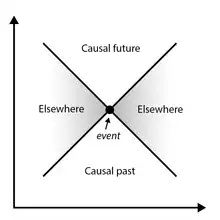
| General relativity |
|---|
 |
|
In relativity, an event is anything that happens that has a specific time and place in spacetime. For example, a glass breaking on the floor is an event; it occurs at a unique place and a unique time.[1] Strictly speaking, the notion of an event is an idealization, in the sense that it specifies a definite time and place, whereas any actual event is bound to have a finite extent, both in time and in space.[2][3]
An event in the universe is caused by the set of events in its causal past. An event contributes to the occurrence of events in its causal future.
Upon choosing a frame of reference, one can assign coordinates to the event: three spatial coordinates to describe the location and one time coordinate to specify the moment at which the event occurs. These four coordinates together form a four-vector associated to the event.
One of the goals of relativity is to specify the possibility of one event influencing another. This is done by means of the metric tensor, which allows for determining the causal structure of spacetime. The difference (or interval) between two events can be classified into spacelike, lightlike and timelike separations. Only if two events are separated by a lightlike or timelike interval can one influence the other.
Uncertainty principle
The concept of an event in relativity as a point in spacetime with arbitrarily high precision size breaks down when considering the uncertainty principle, which stipulates that there is a minimum size or accuracy for measurements made in the universe, and you cannot have arbitrary precision in measurements. This has practical effect for example, next to a black hole. Everywhere in spacetime, there are virtual (A.K.A. unmeasurable) particle-antiparticle pairs which spontaneously appear and then disappear, due to the uncertainty principle. Directly next to a black hole's event horizon, one of the elements of a virtual particle-antiparticle pair (either the particle or the antiparticle) gets sucked into the black hole, leaving the other to be emitted out into spacetime; this is the source of Hawking radiation.
P. W. Bridgman found the event concept insufficient for operational physics in his book The Logic of Modern Physics.[4]
See also
References
- ↑ A.P. French (1968). Special Relativity, MIT Introductory Physics Series, CRC Press, ISBN 0-7487-6422-4, p. 86.
- ↑ Leo Sartori (1996). Understanding Relativity: a simplified approach to Einstein's theories, University of California Press, ISBN 0-520-20029-2, p. 9.
- ↑ Fock, V. (1964). The Theory of Space, Time and Gravitation. Pergamon Press. p. 33.
By "event" we mean an instantaneous occurrence that can be characterized by a point in space and a corresponding moment of time.
- ↑ P. W. Bridgman (1827) The Logic of Modern Physics @ Internet Archive